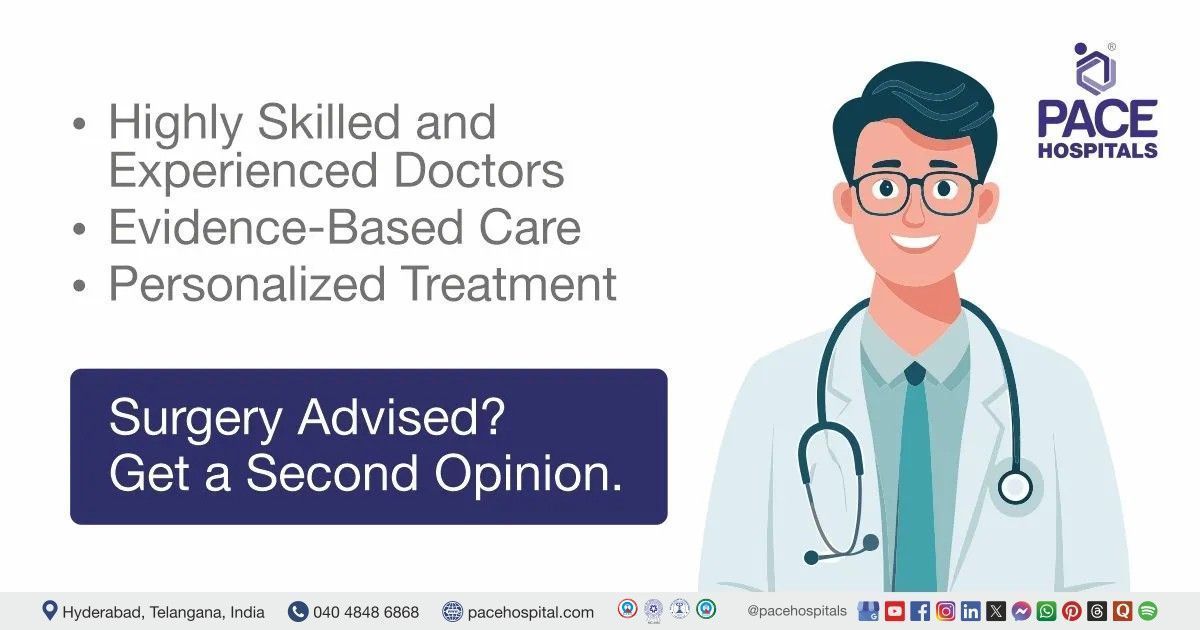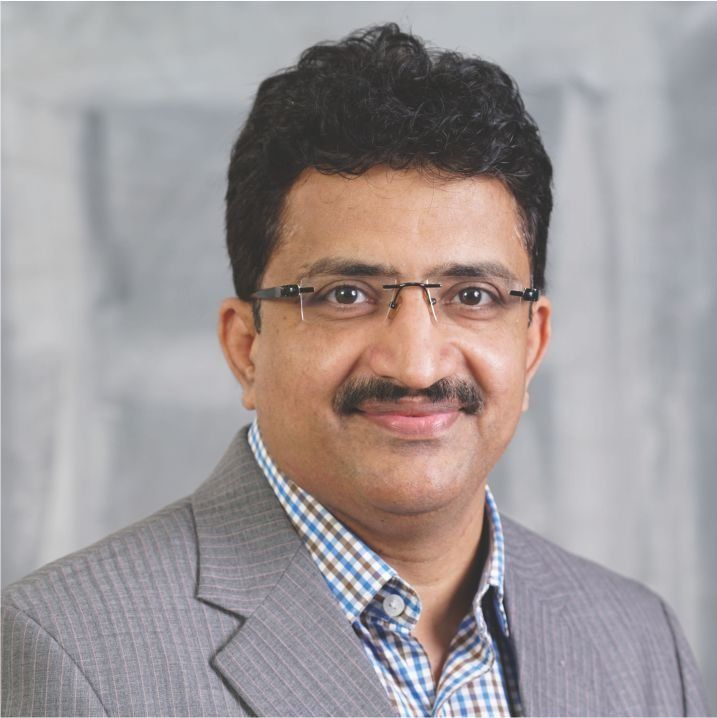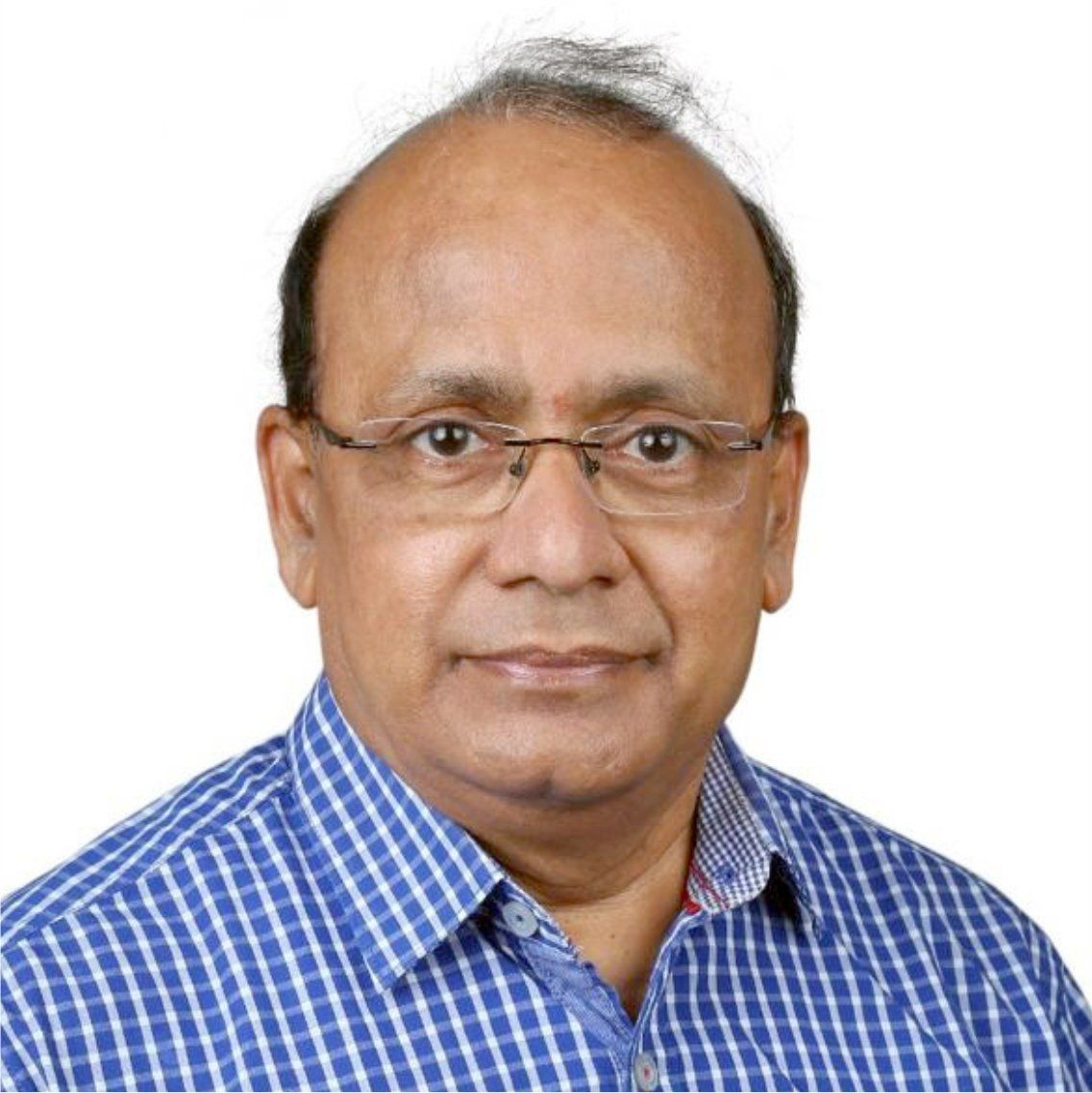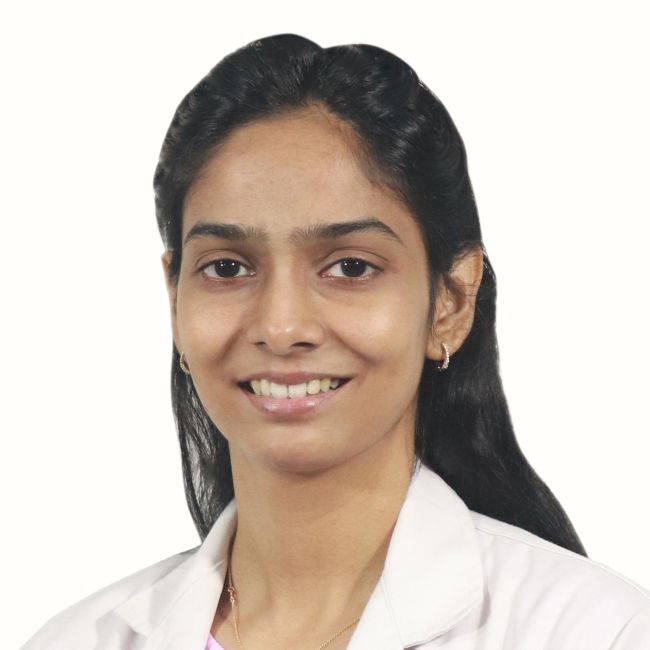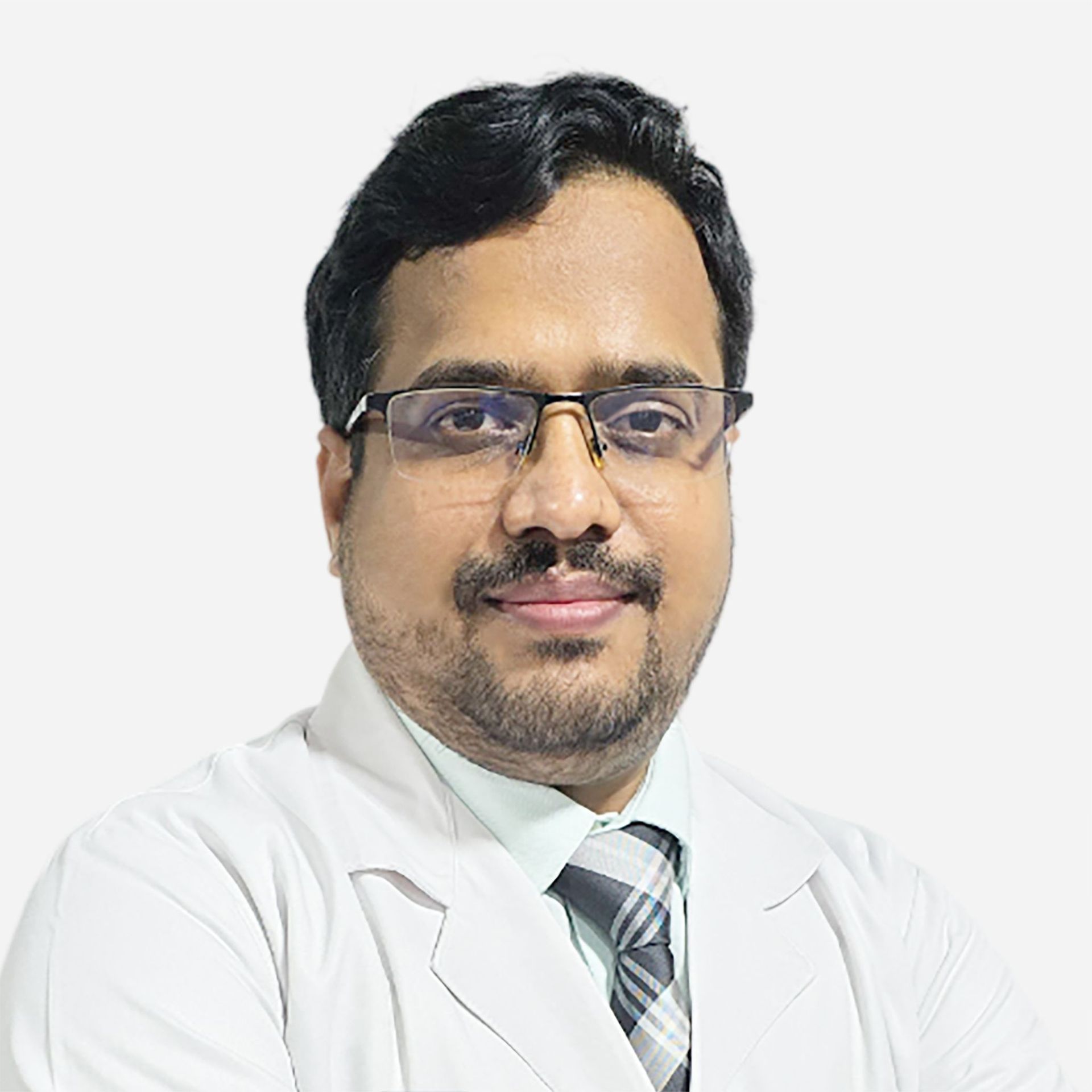Best Colonoscopy Specialist in Hyderabad for Advanced Tests & Care
PACE Hospitals
✅ Recommended by 9,452 Happy Patients. Get hassle-free appointments with a Colonoscopy Specialists.
Dr. Govind Verma
MD, DM (Gastroenterology), Fellowship in EUS
Experience : 30+ years
Interventional Gastroenterologist & Hepatologist
Specialist
Functional and Motility Disorders: Constipation and fecal incontinence, Gastroparesis, Functional abdominal pain, Hirschsprung’s disease, Diffuse esophageal spasm
Esophagus Disorders: Acid reflux / GERD (Gastroesophageal Reflux Disease), Achalasia cardia, Esophagitis, Esophageal varices, Barrett's esophagus, Esophageal cancer
Stomach Disorders: Gastritis, Peptic ulcers, Stomach cancer, H. pylori infection, Functional dyspepsia
Small and Large Intestine Disorders: Irritable Bowel Syndrome (IBS), Inflammatory Bowel Disease (IBD) (Ulcerative colitis, Crohn’s disease), Celiac disease, Intestinal infections, Colorectal cancer, Diverticulitis, Intestinal obstruction, Constipation and chronic diarrhea, Gas and bloating
Rectal and Anal Conditions: Hemorrhoids (Piles), Anal fissures, Anal fistulas, Rectal bleeding, Proctitis
Liver Diseases: Hepatitis A, B, C, E; Fatty liver disease (NAFLD/NASH), Liver cirrhosis, Liver cancer (Hepatocellular carcinoma), Autoimmune hepatitis, Wilson’s disease, Hemochromatosis
Gallbladder and Bile Duct Disorders: Gallstones, Cholecystitis, Bile duct obstruction, Cholangiocarcinoma (bile duct cancer), Primary sclerosing cholangitis (PSC)
Pancreatic Diseases: Acute and chronic pancreatitis, Pancreatic pseudocysts, Pancreatic cancer, Exocrine pancreatic insufficiency
Expertise
Endoscopy (Upper GI, Colonoscopy, Sigmoidoscopy), Capsule endoscopy
Endoscopic Retrograde Cholangiopancreatography (ERCP)
Polypectomy, Biopsies of the GI tract, PEG tube insertion
Endoscopic Ultrasound (EUS) and EUS-Guided Interventions: EUS-guided biopsies, EUS-guided pancreatic pseudocyst drainage, Biliary and pancreatic duct stenting
Third-Space Interventional Endoscopy: POEM (Peroral Endoscopic Myotomy), ARMS (Antireflux Mucosal Resection), GERD-X procedure for reflux disease
Advanced Endoscopic Bariatric and Oncology Procedures: Endoscopic Sleeve Gastroplasty (ESG), Endoscopic Submucosal Dissection (ESD), Endoscopic Mucosal Resection (EMR)
Comprehensive Hepato-Biliary and Pancreatic Interventions
Consultation Details
Languages Spoken: English, Hindi, Telugu, Marathi
Timing: Mon to Sat - 10 AM to 6 PM
Location: PACE Hospitals, HITEC City & Madinaguda
Dr. M Sudhir
MBBS, MD (Internal Medicine), DNB (Internal Medicine), DNB (Gastroenterology), FICP
Experience : 40+ years
Sr. Gastroenterologist and Hepatologist (Liver Specialist)
Specialist
- Inflammatory Bowel Diseases (IBD): Ulcerative colitis, Crohn’s disease
- Gastrointestinal Motility Disorders: Achalasia cardia, Hirschsprung’s disease, Diffuse esophageal spasm
- Pancreatico-Biliary Disorders: Acute and chronic pancreatitis, Pancreatic pseudocysts, Common bile duct (CBD) stones, Gallstones, Biliary and pancreatic malignancies
- Functional Bowel Disorders: Constipation, Irritable Bowel Syndrome (IBS), Gastroparesis, Functional abdominal pain
- Liver Diseases: Chronic liver disease, Hepatitis, Cirrhosis and liver-related complications
Expertise
- Diagnostic Procedures: Endoscopy (Upper GI, Colonoscopy, Sigmoidoscopy), Capsule endoscopy, ERCP (Endoscopic Retrograde Cholangiopancreatography)
- Advanced and Therapeutic Endoscopy: Third-Space Endoscopy Techniques, POEM (Peroral Endoscopic Myotomy) for achalasia, Endoscopic Sleeve Gastroplasty (ESG) for obesity, Endoscopic Ultrasound (EUS) for pancreatic, biliary, and GI evaluation
Consultation Details
Languages Spoken: English, Hindi, Telugu
Timing: Mon to Sat - 9 AM to 1 PM
Location: PACE Hospitals, HITEC City
Dr. Padma Priya
MBBS, MD (Internal Medicine), DrNB (Medical Gastroenterology)
Experience : 9+ years
Consultant Gastroenterologist and Hepatologist
Specialist
Specialist in gastrointestinal (GI), pancreatic and hepatic diseases such as gastroesophageal reflux disease (GERD), anal and rectal disorders such as piles (hemorrhoids), anal fissures and anal fistulas, Inflammatory bowel disease (Ulcerative colitis and Crohn’s disease), Inflammatory bowel Syndrome, Peptic ulcers, Celiac disease, GI infections, Gallbladder stones, Biliary tract disorders, Liver diseases, Pancreatic disorders, Gastrointestinal bleeding, Diverticulitis, Eosinophilic Gastroenteritis, Gastrointestinal motility, Gastrointestinal cancer, Malabsorption Syndromes etc.
Expertise
ERCP, EUS, Colonoscopy, Sigmoidoscopy, Capsule endoscopy, Endoscopic mucosal resection, Endoscopic ultrasound-Fine needle aspiration / Fine needle biopsy, Polypectomy, Esophagogastroduodenoscopy (EGD), Endoscopic ultrasound (EUS)-guided, Cystogastrostomy, Spiral enteroscopy, Oesophageal manometry, Ano-rectal manometry, PEG tube insertion, Narrow-band imaging, Endoscopic variceal ligation, Argan plasma coagulation, Haemoclip deployment, NJ Tube placement, Oesophageal bougie dilation, Achalasia balloon dilation, Colonic stricture dilation, Pyloric balloon dilation, etc.
Consultation Details
Languages Spoken: English, Hindi, Telugu
Timing: Mon to Sat - 10 AM to 6 PM
Location: PACE Hospitals, HITEC City & Madinaguda
Dr. P Arun Kumar
MBBS, DNB (General Medicine), DM (Medical Gastroenterology)
Experience : 7+ years
Consultant Gastroenterologist and Hepatologist
Specialist
Dr. P Arun Kumar is recognized for his expertise in advanced diagnostic and therapeutic gastroenterology and hepatology procedures, offering comprehensive care for complex gastrointestinal and liver conditions.
- Upper GI Endoscopy
- Colonoscopy and Sigmoidoscopy
- Capsule Endoscopy
- Endoscopic Mucosal Resection (EMR)
- Polypectomy (Hot and Cold Snare)
- Endoscopic Variceal Ligation (EVL)
- Argon Plasma Coagulation (APC)
- Endoscopic Hemoclipping
- Esophageal and Colonic Dilatation
- CRE Balloon Dilatation
- Colonic Stricture Dilatation
- PEG and NJ Tube Placement
- Narrow Band Imaging (NBI)
- Diagnostic and Therapeutic Endoscopic Ultrasound (EUS)
- Pancreatico-biliary Endoscopic Interventions
- Esophageal and Anal Manometry
Expertise
With a strong focus on evidence-based and patient-centered care, Dr. P Arun Kumar specializes in diagnosing and managing a wide spectrum of gastrointestinal, liver, pancreatic, and functional bowel disorders.
- Gastroesophageal Reflux Disease (GERD)
- Dyspepsia and Reflux Disorders
- Peptic Ulcer Disease (Gastric & Duodenal Ulcers)
- H. Pylori–associated Gastritis
- Acute and Chronic Diarrhea
- Functional Bowel Disorders
- Irritable Bowel Syndrome (IBS)
- Chronic Constipation and GI Motility Disorders
- Neuro-gastroenterological Conditions
- Inflammatory Bowel Disease (Ulcerative Colitis & Crohn’s Disease)
- Celiac Disease and Malabsorption Syndromes
- Gastrointestinal Bleeding
- Esophageal Disorders, including Eosinophilic Esophagitis
- Esophageal Carcinoma
- Acute and Chronic Pancreatitis
- Biliary Tract Disorders
- Acute and Chronic Liver Diseases
- Viral Hepatitis (A, B, C, D & E)
- Metabolically Dysfunctional-Associated Steatotic Liver Disease (MASLD)
- Fatty Liver Disease and Alcohol-related Liver Disease
Consultation Details
Languages Spoken: English, Hindi, Telugu
Timing: Mon to Sat - 9 AM to 6 PM
Location: PACE Hospitals, HITEC City & Madinaguda
Top Colonoscopy Specialists in Hyderabad for Safe and Comfortable Procedures
PACE Hospitals is recognised for having the Top Colonoscopy specialists in Hyderabad, India, offering advanced procedures that focus on accurate diagnosis and effective treatment of digestive conditions. Our skilled colonoscopy specialist doctors combine medical expertise with a patient-friendly approach to ensure safe, reliable, and comfortable care.
Using modern diagnostic tools and minimally invasive techniques, the top colonoscopy doctors at PACE Hospitals carefully examine the colon to detect polyps, ulcers, inflammation, or early signs of colorectal disease. Every procedure is carried out with precision, helping patients receive timely and accurate results.
Services include diagnostic colonoscopy as well as therapeutic procedures such as polyp removal, stricture dilatation, biopsy, and customised screening options. Each patient is guided by the best doctor for colonoscopy in Hyderabad, who ensures that treatment is tailored to individual needs with a focus on safety, comfort, and long-term digestive health.
Widely recognised for excellence in gastroenterology, PACE Hospitals is home to the Best Colonoscopy doctor in Hyderabad, India. From the initial consultation through the procedure and follow-up care, patients receive personalised attention, advanced treatment options, and ongoing support. The focus is on restoring digestive health, improving comfort, and preventing future complications with a compassionate and patient-centred approach.
Frequently Asked Questions (FAQs) on Colonoscopy
What diseases can be detected by a colonoscopy?
A colonoscopy can detect colorectal cancer, precancerous polyps, inflammatory bowel diseases (like Crohn’s disease and ulcerative colitis), diverticulosis, bleeding, ulcers, and infections. It is also used to identify causes of chronic diarrhea, constipation, or unexplained abdominal pain. Early detection of polyps during colonoscopy can prevent the development of colorectal cancer, the procedure’s most significant benefit. Such evaluations are best performed by the best colonoscopy doctor in Hyderabad, India.
Why colonoscopy is done?
A colonoscopy is performed to screen for colorectal cancer in asymptomatic adults, investigate symptoms such as rectal bleeding, persistent diarrhea, or unexplained abdominal pain, and follow up on abnormal findings from other tests. It is also used to remove precancerous polyps (polypectomy), monitor chronic bowel diseases, and evaluate the colon after surgery or cancer treatment. Many patients rely on top colonoscopy specialists in Hyderabad, India for these evaluations.
Who is the best colonoscopy doctor in Hyderabad?
At PACE Hospitals, colonoscopy procedures are performed by experienced Colonoscopy Doctors in Hyderabad, including Dr. Govind Verma, Dr. M Sudhir, and Dr. Padma Priya. They use colonoscopy to investigate symptoms such as abdominal pain, rectal bleeding, persistent bowel changes and unexplained digestive issues, as well as for routine colorectal cancer screening. Their approach focuses on safe procedures, accurate diagnosis and clear follow-up guidance based on the findings.
Is colonoscopy painful?
Most patients receive sedation or anesthesia, so they do not experience pain during the procedure. Some mild discomfort, bloating, or cramping may occur, especially if no sedation is used. With deep sedation, commonly using a non-barbiturate sedative, patients typically sleep through the procedure and have no memory of it. These concerns are addressed by a trusted colonoscopy doctor.
How long does a colonoscopy take?
A typical colonoscopy lasts 30 to 60 minutes for the procedure itself. With preparation, sedation, and recovery, the total time at the medical facility is usually 2–3 hours. The duration depends on the complexity of the exam and whether interventions like polyp removal are required. Patients often consult a good colonoscopy specialist to discuss these details.
Is colonoscopy safe?
Colonoscopy is generally a safe procedure when performed by a qualified and experienced healthcare provider. While minor risks like bleeding, bowel perforation, or adverse reactions to sedation can occur, serious complications are rare. Thorough pre-procedure evaluation and proper technique help minimize risks. For most patients, the benefits, particularly early detection of colorectal cancer and removal of precancerous polyps, significantly outweigh the potential risks. These safety measures are overseen by the best doctor for colonoscopy in Hyderabad, India.
What is a colonoscopy?
A
colonoscopy is a diagnostic and therapeutic procedure that involves the insertion of a flexible tube with a camera (colonoscope) through the rectum to examine the inner lining of the large intestine (colon). This procedure enables doctors to identify abnormalities such as polyps, tumors, ulcers, bleeding, or inflammation. In addition to visual inspection, it also allows for interventions such as polyp removal and tissue biopsy for further evaluation. For expert care, consulting a
colonoscopy specialist is advised.
How many polyps are normal in a colonoscopy?
Finding a few small polyps is common, especially in people over 50, but the number considered normal depends on risk factors, age, and family history. No polyps are ideal, but 1–2 small adenomatous polyps may be expected in some screenings. Multiple polyps, large polyps, or certain types may indicate a need for closer follow-up or more frequent screening. These cases are often monitored by
colonoscopies doctors in Hyderabad.
Does colonoscopy need anesthesia?
Colonoscopy typically requires sedation, most commonly moderate to deep ("twilight") sedation, so patients are comfortable and have little or no memory of the procedure. Propofol is the most common agent for deep sedation. Unsedated colonoscopy is rare in most countries, but it is possible if the patient prefers. The choice depends on the patient's preference, health status, and the provider's expertise. These options are explained by a
colonoscopy specialist.
How clear should stool be for colonoscopy?
Bowel preparation must make the stool clear or yellow-tinged and nearly liquid, resembling urine, without solid particles. This ensures optimal visualization of the colon lining. Poor preparation may lead to missed lesions or the need to repeat the procedure. Follow doctor’s preparation instructions carefully for the best results. Guidance is best given by
colonoscopies doctors in Hyderabad, India.
Can you have a colonoscopy with a hernia?
Most abdominal hernias do not pose a barrier to colonoscopy; however, large or irreducible hernias may slightly increase the risk of complications, such as bowel perforation. The healthcare provider will assess the hernia based on its location and size to determine whether the procedure can be performed safely and effectively. In rare cases, special precautions or alternative diagnostic approaches may be recommended. For proper evaluation, many consult the
best doctor for colonoscopy treatment in Hyderabad, India.
What to do before a colonoscopy?
Avoid solid foods for at least 8 hours and clear liquids for at least 2 hours before the procedure. Follow the doctor's bowel prep regimen, usually requiring a special diet and laxative solutions, to clean the colon. Provide a complete medical history, including medications and allergies. Arrange for a responsible adult to drive you home post-procedure due to sedation effects. For clear guidance and safe preparation, it is best to follow the advice of a
colonoscopy best doctor.
Can a colonoscopy be done during menstruation?
Colonoscopy can be performed during menstruation, as there is no increased medical risk associated with it. Inform the provider about menstruation for comfort and personal reasons, but it does not affect the safety or efficacy of the procedure. Using a sanitary pad is usually sufficient, while tampons are generally not recommended during bowel preparation. Women often prefer consulting a
female colonoscopy doctor for added comfort.
What to eat after a colonoscopy?
After the colonoscopy, it is advised to start with light, easily digestible foods such as clear broths (light soups), plain crackers (low fiber diet), and applesauce. The regular diet can be gradually reintroduced based on individual tolerance. It is suggested to avoid alcohol, spicy or fatty foods, and high-fiber items during the initial meals to prevent gastrointestinal discomfort. Maintaining adequate hydration is important during recovery. Any unusual or concerning symptoms need to be monitored, and specific post-procedure instructions provided by the healthcare provider should be followed closely. These recovery plans are often supported by the
best colonoscopy specialist in Hyderabad, India.
Can a colonoscopy detect a rectocele?
A rectocele (bulging of the rectum into the vagina) is typically diagnosed by physical examination rather than colonoscopy. Colonoscopy visualizes the inner lining of the colon and rectum but cannot directly detect or confirm a rectocele, as this is a structural, not mucosal, abnormality. Patients may still consult a
trusted colonoscopy doctor for evaluation.
Can a colonoscopy detect diverticulitis?
A colonoscopy can detect
diverticulosis (small pouches in the colon wall) and sometimes acute diverticulitis, but it is usually avoided during an acute flare to prevent complications like perforation.
CT scan is preferred for diagnosing active diverticulitis. Colonoscopy is used to evaluate chronic or recurrent symptoms and to rule out other causes. Many rely on the
leading doctor for colonoscopy in Hyderabad, India at PACE Hospitals for such cases.
How often should a colonoscopy be done?
The frequency of colonoscopy depends on individual risk factors and medical history. For average-risk adults, it is usually advised every 10 years starting at age 45. Those with a family history of
colorectal cancer or polyps may need screening earlier and more often, typically every 5 years. Patients with previous polyps or colorectal cancer may require follow-up in 3 to 5 years or sooner. Individuals with
inflammatory bowel disease (IBD) may need colonoscopy every 1 to 2 years. A healthcare provider should guide the exact interval. These schedules are managed by the
best colonoscopy doctor in Hyderabad at PACE Hospitals.
What is a partial colonoscopy?
A partial colonoscopy, also known as a sigmoidoscopy, is a diagnostic procedure that examines only the lower part of the colon, typically the rectum and sigmoid colon. Unlike a full colonoscopy, which visualizes the entire colon, a partial colonoscopy is limited in scope and is often used to investigate symptoms like suspected inflammation, rectal bleeding or chronic diarrhea in the lower bowel. It may also be used for follow-up of previously detected abnormalities. The procedure is usually shorter, may not require full sedation, and has quicker recovery time. Such cases are reviewed by the
best Colonoscopy doctor in Hyderabad, India.
Can a colonoscopy detect hemorrhoids?
A colonoscopy can detect internal
hemorrhoids, particularly in the lower rectum and anal canal, especially when retroflexing the scope for better visualization. However, hemorrhoids are usually diagnosed by physical exam and patient symptoms. Colonoscopy is more commonly performed to exclude other causes of rectal bleeding, but if hemorrhoids are seen during the procedure, their presence and potential contribution to symptoms can be assessed. These are often confirmed by a
colonoscopy specialist.
How long is recovery after colonoscopy?
Recovery after a colonoscopy is usually quick, with most people feeling normal within a few hours. Sedation effects may last for the rest of the day, so rest is recommended. Mild bloating or gas is common and typically resolves the same day. Most patients can resume normal eating and activities by the next day. If polyps were removed, strenuous activity should be avoided for 24–48 hours. Any severe pain, bleeding, or fever should be reported to a doctor promptly. These recovery guidelines are supported by a good colonoscopy specialist.
How long does it take to get colonoscopy biopsy results?
Colonoscopy biopsy results generally take 5 to 10 days to be processed and reviewed, depending on the laboratory and the complexity of the findings. In some cases, results may be available sooner, especially if testing is routine. However, if further analysis or specialized testing is needed, it may take longer. The healthcare provider will contact the patient to discuss the results as soon as they are available. Such follow-ups are often managed by the top colonoscopy doctors in Hyderabad at PACE Hospitals.
What our patients have to say
Why choose PACE Hospitals?
- A Multi-Super Speciality Hospital.
- NABH, NABL, NBE & NABH - Nursing Excellence accreditation.
- State-of-the-art Liver and Kidney transplant centre.
- Empanelled with all TPAs for smooth cashless benefits.
- Centralized HIMS (Hospital Information System).
- Computerized health records available via website.
- Minimum waiting time for Inpatient and Outpatient.
- Round-the-clock guidance from highly qualified super specialist doctors, surgeons and physicians.
- Standardization of ethical medical care.
- 24X7 Outpatient & Inpatient Pharmacy Services.
- State-of-the-art operation theaters.
- Intensive Care Units (Surgical and Medical) with ISO-9001 accreditation.
Share on
Request an appointment
Fill in the appointment form or call us instantly to book a confirmed appointment with our super specialist at 04048486868
Appointment request - health articles
Recent Articles


